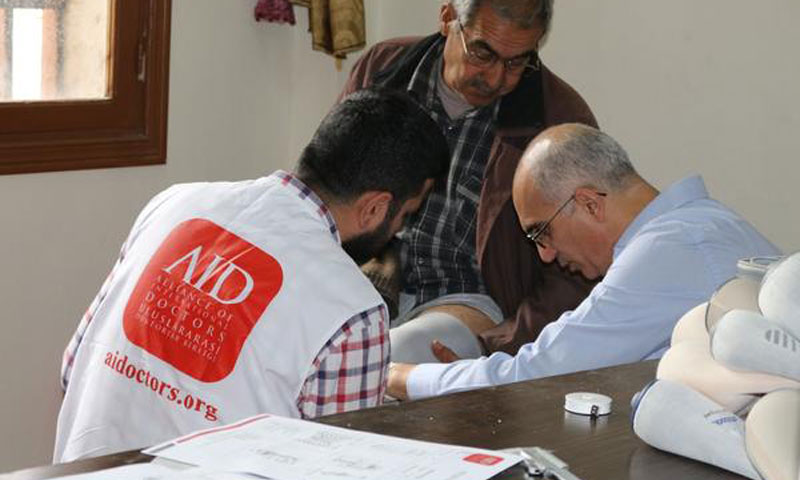Mohammad Jijo, a young man in his thirties and whose right leg has been amputated a few years ago, dreams to have an intelligent prosthetic through which he can adapt to his health condition. The one he describes as “bad and uncomfortable” resulting from the plastic limb he got free of charge after his injury in April 2013, during the battle near al-Kindi Hospital in Aleppo governorate.
The Local Council in the city of Jarabulus, in northern Aleppo, started providing amputees, in the Euphrates Shield area, with intelligent prostheses through its social services office on Sunday, 5 November. The Council invited the people who wish to get a prosthesis to go to the Council’s headquarters. This is the first phase of the Council’s plan to take care of people with disabilities.
Precise statistics about the numbers of war-related injuries in the region and in Syria, in general, do not actually exist. However, amputees get the needed support from organizations or individualistic projects, according to what Enab Baladi observed in a number of former reports that covered different Syrian regions.
Dozens of injured people need prostheses, including Haytham, a boy whose leg has been mutilated during the explosion of a mine, which belongs to the remnants of the Islamic State Group (IS), in the city of Sawran, north of Aleppo.
In a former interview with Enab Baladi, Mahmoud Abu Ahmed, Haytham’s father demanded that specialized organization support his child.
“My son is paralyzed; we help him to the bathroom. He is deprived of school, playing with his friends and all his rights in life,” the father said.
165 Amputees’ Names Handed Over to Turkey
The Council in the city of Jarabulus gave the names of 165 amputees to Turkey, according to Noor Mohammad, the head of the services office in the Council, who said that embedding of the prostheses will take place in the Council’s headquarters.
“The prostheses are electronic and intelligent; we are able to provide them in cooperation with Doctors Without Borders Organization,” she told Enab Baladi.
According to the Council, the Organization took the measurements of 18 amputees, early in November, pointing out that embedding the upper and lower limbs will be in the Council after 15 days from the date of taking measurements.
Mohammad said that this process “will be repeated after the completion of each group [of the people who registered to have a prosthesis], in the coming period, on the condition that it includes the people displaced to the region and all the residents of the Euphrates Shield.”
She also said that this process is a phase of a continuous project.
In early 2017, Jarabulus city received hundreds of displaced people from Al-Wa’r neighborhood in Homs, who are mainly located in the surrounding areas and camps. Other areas of Jarabulus witnessed a resumption of trade with Turkey, as well as an active reconstruction movement due to the sense of security which prevailed in the city in comparison with other burning regions in Syria.
For a long time, Mahmoud, an amputated young man, was kept under treatment until he finally recovered in Turkey.
He told Enab Baladi that he needs a better prosthesis. “In the region, all the prostheses are ordinary and plastic provided by some parties for free. However, the electronic intelligent prostheses are costly.”

